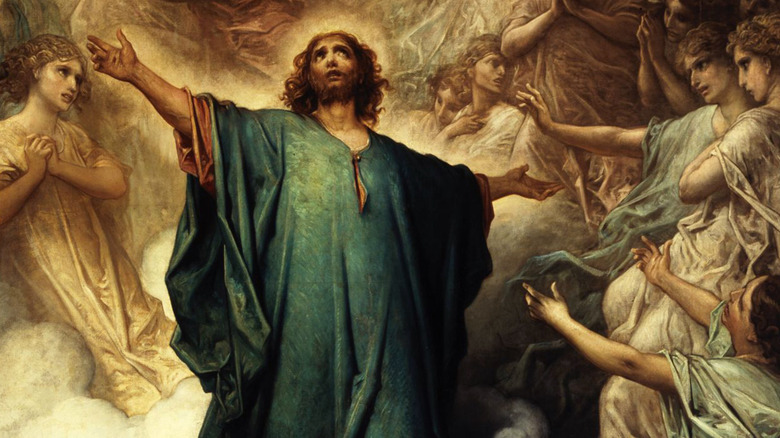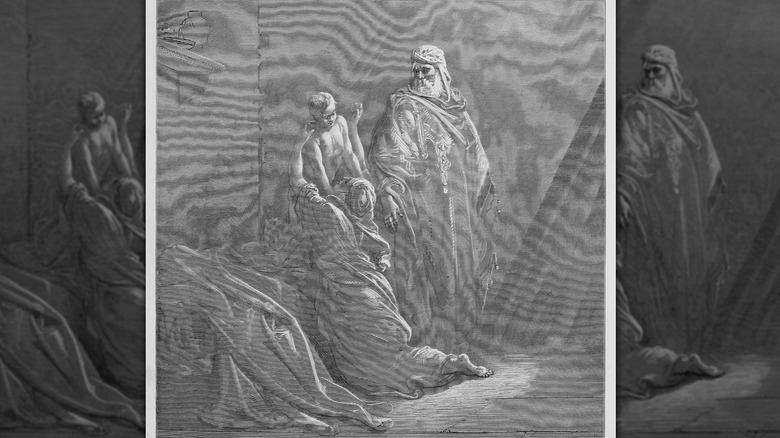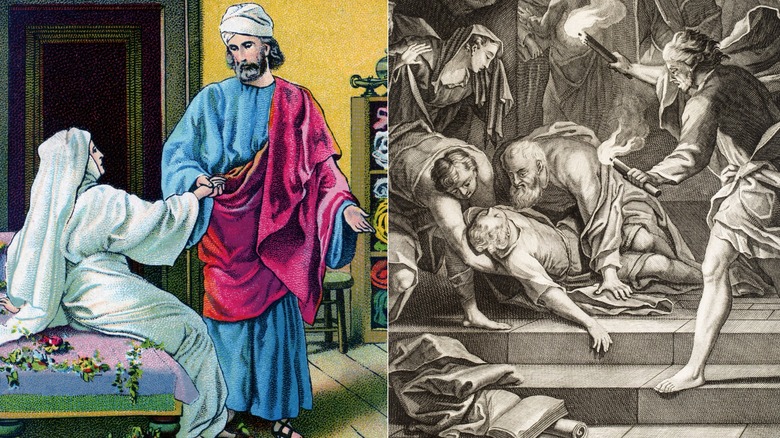Was Jesus The Only One To Rise From The Dead In The Bible?
The divinity of Jesus is as fundamental to Christianity as the faith in his resurrection: That following his crucifixion, Jesus rose from the dead three days later and ascended into heaven. The book of Revelation names him "firstborn of the dead" — that is, he is taken as the first to lead the way to resurrection and eternal life after death in God's coming kingdom, per Christianity.com. But the concept of resurrection was not unique to early Christianity. From Osiris in the Egyptian pantheon to the phoenix of Greek mythology, divine or magical beings rising from the dead was a widespread theme.
Nor is Jesus's resurrection the only such instance within the Christian tradition. The Gospels contain several instances of Jesus raising others from the dead. The most famous is the resurrection of Lazarus in John 11, but he also revived the son of a widow in Luke 7 and the daughter of Jairus in Luke 8. In Matthew 27, on the death of Jesus, the tombs of holy men broke open, and after his resurrection, they too walked the Earth again.
What sets Jesus' resurrection apart from those he facilitated in Christian thought is the ascension. Jesus didn't return from death only to die again after a natural lifespan, but went straight back to God, paving the way for others. The title given to him in Revelations is presaged by Jesus's own words in John 14: "Because I live, you also will live."
Elijah and Elisha resurrected people in the Old Testament
Resurrection predates Jesus in the Bible by centuries. In fact, the story told in Luke 7 — of Jesus resurrecting the son of a widow — echoes an episode from the Old Testament. In the first book of Kings, God commanded Elijah to go to Zarephath and seek out a widow for food and shelter. The widow only had flour and olive oil to sustain her during a drought, and Elijah told her that neither of her meager stores would be exhausted until rain came to Zarephath — and so it was. But her son grew ill and died, and after seeing the widow's grief, Elijah put the boy on a bed and beseeched God to resurrect him.
Elijah's disciple, Elisha, also had the power of resurrection — he revived the son of a Shunammite woman in the second book of Kings. Elisha foretold the boy's birth, but some time after it came to pass, the boy complained of a headache and died. At first, Elisha tried to revive the boy by having his servant place his staff on the child's face. When that failed, Elisha prayed to God and laid himself over the boy, who gradually came back to life.
Even after death, Elisha retained some power of resurrection. After his burial, a group of Israelites were trying to hold a funeral for a man when they saw raiders. They threw the man into Elisha's tomb, and he was revived when his body touched the prophet's bones.
Peter and Paul raised one man each from the dead
As acts of resurrections preceded Jesus, so did they follow him. After his ascension, his disciple Peter traveled the region, spreading the word of Christ. At the same time, Acts 9 recounts how there was a charitable, devoted woman named Tabitha (Dorcas in Greek) living in Joppa. When she fell ill and died, two disciples went to Lydda to intercept Peter, who was staying there at the time. Peter went with them, and upon seeing Dorcas lying dead in her room, he prayed to God and commanded her to get up. This she did, and the miracle converted many in Joppa to Christianity.
Later in the same book, St. Paul was traveling in Greece when he came to the city of Troas. There, while Paul held court, a young man named Eutychus sat in a window. He grew more tired the longer Paul's talk lasted, and it lasted until past midnight. When Eutychus finally fell asleep, he fell three stories and was killed. Paul revived him without even a prayer; he just threw his arms around the boy, declared him alive, and went back upstairs to eat.


